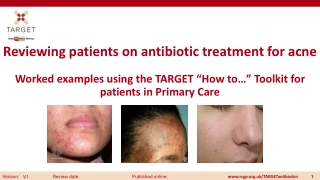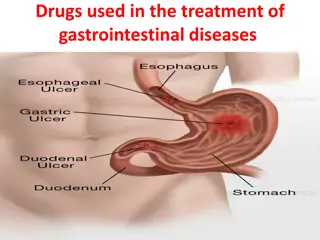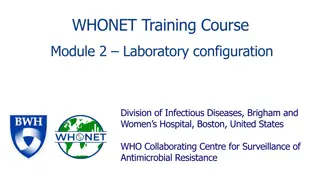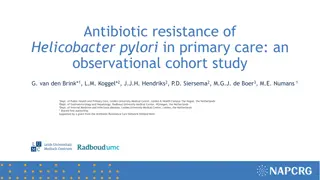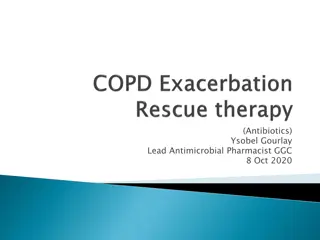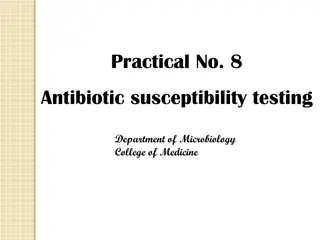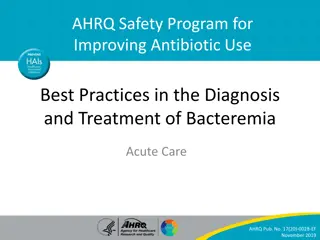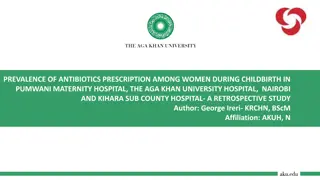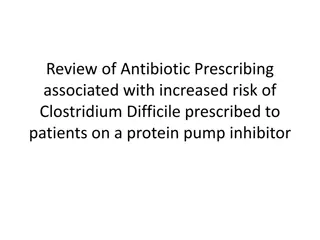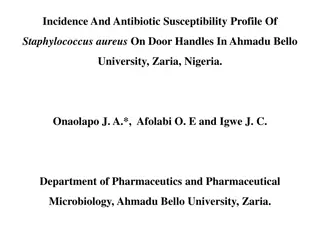Reviewing patients on antibiotic treatment for acne
Understanding the importance of reviewing patients on antibiotic treatment for acne, the resource provides insights on managing acne patients currently on antibiotics, referral considerations, and self-care advice. It emphasizes the need to address antibiotic resistance concerns and the challenges o
0 views • 24 slides
Antibiotic Adaptation in Renal Insufficiency - Dosage Adjustments and Risks
Understanding the importance of adapting antibiotic therapy in patients with renal insufficiency is crucial to ensure efficacy and minimize risks. This content covers various factors influencing antibiotic selection, dosing adjustments based on patient parameters, and the risks associated with inapp
0 views • 52 slides
Understanding Antibiotic Therapy in the ICU: Strategies and Considerations
Delve into the world of antibiotic therapy in the intensive care unit (ICU) with a focus on identifying the enemy pathogens, selecting the appropriate antibiotics, and formulating effective treatment plans. Explore the nuances of Gram-positive and Gram-negative bacteria, along with other key bacteri
4 views • 76 slides
Peptic Ulcer Disease: Treatment Approaches and Helicobacter pylori Eradication
Common gastrointestinal conditions such as peptic ulcers can be effectively treated through approaches like eradicating H. pylori infection, reducing gastric acid secretion, and using mucosal protecting agents. Helicobacter pylori eradication is crucial for healing ulcers and preventing recurrence,
0 views • 27 slides
Understanding Antibiotic Use in UTI Management: A Critical Review
Antibiotic use in urinary tract infections (UTIs) is crucial, but concerns exist due to rising resistance. E. coli, common in UTIs, can lead to resistant blood stream infections. Proper diagnosis and treatment are essential to combat antibiotic resistance and ensure patient recovery.
2 views • 44 slides
WHONET Training Course: Laboratory Configuration and Setup
Understanding the laboratory configuration process in WHONET is crucial for effective data entry and analysis. This module guides users on setting up a new laboratory, entering country and lab details, defining antibiotics, sample locations, and data fields, creating microbiological alerts, and savi
3 views • 57 slides
Antibiotic Resistance of Helicobacter pylori in Primary Care: Observational Cohort Study
Research focused on Helicobacter pylori eradication success and antibiotic resistance development in primary care settings, revealing an 8% rate of treatment failure leading to a second treatment within 12 months. The study suggests a need to revise treatment guidelines, potentially targeting specif
0 views • 6 slides
Understanding COPD Management and Antibiotic Therapy
Explore the role of rescue therapy in COPD management, including the use of antibiotics and steroids, to address exacerbations and improve quality of life. Learn about the benefits, guidelines, and criteria for identifying patients who may benefit from home rescue courses. Discover how antibiotic th
0 views • 27 slides
Burn Injury Complications and Treatment: A Case Study
Alison, a young woman with a burn foot injury, undergoes skin grafting which leads to inflammation and bacterial infection. Despite antibiotic treatment, she develops bacteremia and an abscess. The case study explores burn degrees, skin layers, graft types, inflammation causes, bacterial identificat
1 views • 11 slides
Perspectives on Antibiotics Use in Dairy Production
Dairy farmers use antibiotics to treat sick cows for improved animal welfare; organic dairy farmers face restrictions but benefit from higher premiums; concerns about antibiotic resistance in children debunked by medical professionals; milk processors prioritize food safety through rigorous testing
0 views • 6 slides
Understanding Antibiotic Susceptibility Testing Methods
Antibiotic susceptibility testing is crucial for determining effective antibiotics against bacterial infections. Common methods include Kirby-Bauer and agar disk diffusion, evaluating zones of inhibition to categorize susceptibility. Techniques involve seeding agar plates, placing antibiotic disks,
2 views • 17 slides
Rare Case of Neonatal Meningitis with Antibiotic Challenge
A term male baby born with perinatal hypoxia developed neonatal meningitis with convulsions. Blood culture revealed Acinetobacter sp. and Pseudomonas sp. Empirical antibiotic therapy was escalated to Colistin and Ceftazidime due to resistance. Subsequent testing showed colonies resembling Pseudomona
0 views • 17 slides
Optimizing Antibiotic Use in Treating Infections
Antibiotics are vital for treating and preventing infections, but research shows they are often prescribed unnecessarily or misused. Evidence-based guidelines from IDSA can assist in choosing the right therapy based on accurate infectious disease diagnosis and microbiological understanding. Proper s
1 views • 51 slides
Understanding Antibiotic Susceptibility Testing
Antibiotic susceptibility testing is crucial in determining the effectiveness of antibiotics against specific bacteria. The Kirby-Bauer method, a standardized paper disk agar diffusion method, is commonly used for this purpose. By observing zones of inhibition around antibiotic disks on agar plates,
1 views • 21 slides
Best Practices for Managing Bacteremia and Antibiotic Use
This resource highlights best practices for managing bacteremia and improving antibiotic use in acute care settings. It covers recommendations for blood culture collection, organism-specific management, de-escalation of antibiotic therapy, and duration of antibiotic therapy. The content also discuss
0 views • 33 slides
Understanding Antibiotic Resistance in E. coli from Poultry, Humans, and the Environment in Malawi
This research project in Malawi investigates the patterns of antibiotic resistance in Escherichia coli isolated from poultry, humans, and the environment. Preliminary results reveal insights into knowledge, attitudes, practices, and microbiological aspects related to antibiotic use. The study aims t
5 views • 8 slides
Antibiotic Prophylaxis Compliance in Rural Queensland Hospitals
Antibiotic prophylaxis is crucial in surgeries to prevent infections. This study aims to determine compliance with prophylactic antibiotic use in surgeries conducted at Gympie, Dalby, and Kingaroy general hospitals in Southeast Queensland. The primary objective is to compare adherence to guidelines
0 views • 18 slides
Community Intravenous Therapy Team in Gloucestershire: Providing Outpatient Antibiotic Therapy
The Community Intravenous Therapy (IVT) Team in Gloucestershire offers outpatient antibiotic therapy services, accepting referrals from GPs, consultants, doctors, and specialist nurses. Changes to the service, details on antibiotic choices, frequently treated infective conditions, and contact inform
0 views • 9 slides
Biomarker-Guided Antibiotic Duration in Sepsis Patients
This research focuses on evaluating the safety and efficacy of a biomarker-guided approach to determine the duration of antibiotic treatment in hospitalized adult patients with sepsis. The study involves a multi-centre randomized controlled trial to assess if a treatment protocol based on monitoring
0 views • 53 slides
Understanding Antimicrobial Stewardship in Healthcare
Exploring the critical aspects of antimicrobial stewardship, including the reasons for antibiotic resistance, considerations for prescribing antibiotics, stewardship checklists, and the role of toolkits in promoting responsible antibiotic use to combat resistance. The importance of monitoring, docum
0 views • 20 slides
Understanding Antibiotic Resistance in Recycled Wastewater
Explore the potential connection between recycled municipal wastewater and antibiotic resistance. Antibiotic-resistant bacteria pose a serious threat, fueled by factors like horizontal gene transfer and high antibiotic dosages in clinical settings. Environmental antibiotic resistance, linked to agri
4 views • 46 slides
Prevalence of Antibiotics Prescription Among Women During Childbirth: A Retrospective Study
This retrospective study aimed to define the prevalence and types of antibiotics prescribed, timing, and duration of prescription for mothers during childbirth at Pumwani Maternity Hospital, The Aga Khan University Hospital in Nairobi, and Kihara Sub-County Hospital. The study focused on determining
0 views • 9 slides
Rare Proteus Species Wound Infection: Case Study and Management
A 65-year-old male presented with a wound infection caused by a rare Proteus species on his left 2nd toe. The patient had a history of diabetes and previous angioplasty. Despite initial antibiotic therapy, amputation of the affected toe was required due to progressive infection. The causative pathog
1 views • 21 slides
Understanding Differences in IV Antibiotic Administration in Emergency Departments
Characterizing the shift from intravenous piggyback to intravenous push antibiotic administration in the emergency department, this study highlights the impact of antibiotic timing on patient outcomes, emphasizing the importance of quick and appropriate empiric antibiotic administration. Insights fr
0 views • 21 slides
Antibiotic Prescribing Impact on Clostridium Difficile Risk in Patients on Protein Pump Inhibitors
Antibiotic prescribing in patients on protein pump inhibitors (PPIs) is associated with an increased risk of Clostridium difficile infection. A review was conducted on high-risk antibiotic prescriptions, revealing instances where patients were prescribed against guidelines, leading to potential comp
0 views • 5 slides
Understanding Modern Non-inferiority Trial Designs in Antibiotic Development
This article discusses the significance of non-inferiority designs in advancing antibiotic development to combat multidrug-resistant bacteria. It emphasizes the importance of distinguishing between UDR, MDR, and XDR bacterial categories in trial design, highlighting challenges in selecting comparato
0 views • 12 slides
Principles of Antibiotic Policies and Resistance
Antibiotic policies play a crucial role in combating antibiotic resistance. Understanding mechanisms of resistance, proper antibiotic use, and the importance of stewardship programs are key in preserving antibiotic effectiveness. The discovery of antibiotics by Fleming revolutionized medicine, but m
0 views • 32 slides
Antibiotic Stewardship in Nursing Homes
This information discusses the importance of antibiotic stewardship programs in long-term care facilities, specifically nursing homes. It outlines the core elements of such programs, strategies for appropriate prescribing patterns, and how these programs support continuity of care. The content empha
0 views • 26 slides
Understanding Antibiotic Resistance: A Comprehensive Overview
Explore the world of antibiotic resistance through a journey that covers the basics, historical developments, mechanisms, consequences, and current challenges. From the first antibiotic discovery to the impact of overuse, this overview delves into the crucial topic of microbial connections and the r
0 views • 19 slides
The Urgent Need for Developing New Antibiotics
Antibiotic resistance has led to devastating consequences, with lives lost and individuals suffering from resistant infections. This urgency is highlighted through real-life cases of individuals facing complications due to antibiotic-resistant bacteria. The narrative follows a 46-year-old man with e
0 views • 19 slides
Innovating Antibiotic Research & Development: The POWER Act Impact
Increased investment in antibiotics and overcoming barriers to development are crucial to combat rising antibiotic resistance. The PATH Act aims to rejuvenate antibiotic R&D by addressing challenges such as competition for funding, limited pipeline drugs, and difficulty in conducting trials due to a
0 views • 11 slides
Understanding Antimicrobial Stewardship in Nursing
Antimicrobial stewardship is crucial in combating antibiotic resistance and promoting appropriate use of antimicrobials. Nurses play a vital role as advocates for correct antibiotic use and are central in patient care, recognizing infections and adverse events. Core elements of antibiotic stewardshi
0 views • 10 slides
Antibiotic Stewardship Awareness Event at University of Pittsburgh
Annual Get Smart Week event at University of Pittsburgh focusing on antibiotic stewardship to raise awareness about the problem of antibiotic resistance. The event featured Dr. Karen Hacker from the Allegheny County Health Department and highlighted the importance of proper antibiotic use to combat
0 views • 6 slides
Antibiotic Resistance in Humans: Impact of Antibiotic Use on Farms
Antibiotic resistance is a growing concern, with evidence suggesting a link between antibiotic use in farm animals and resistant infections in humans. Explore a case study of a Salmonella outbreak in Denmark, where antibiotic treatment failed, leading to fatalities. Learn about the role of selection
0 views • 25 slides
Importance of Antibiotic Sensitivity Testing in Infection Treatment
Antibiotic sensitivity testing is crucial for identifying the most effective antibiotic treatment for bacterial infections. It helps determine the susceptibility of bacteria to antibiotics, guiding clinicians in administering targeted therapy for better outcomes in cases where standard treatments fa
0 views • 11 slides
Antibiotic Prophylaxis in Perioperative Care
Explore the rational approach to perioperative antibiotic use, the importance of antibiotic stewardship in the operating room, and guidelines for selecting and administering antibiotics to prevent surgical site infections. Understand when antibiotic prophylaxis is necessary, which antibiotics to use
0 views • 44 slides
Evidence-Based Treatment of Otitis Externa: Topical Antibiotic/Steroid Drops Effectiveness Review
Clinical guidelines for treating acute otitis externa recommend using topical antibiotic/steroid drops based on the severity of symptoms. This review explores the effectiveness of this treatment approach compared to using only topical antibiotic drops in primary care settings. Search strategies in m
0 views • 14 slides
Improving Healthcare Outcomes through Antibiotic Stewardship and Virtual Rapid Response Program
This project focuses on enhancing healthcare outcomes by implementing an Antibiotic Stewardship program and utilizing Virtual Rapid Response Teleconsultation in skilled nursing facilities. The initiative includes developing best practice protocols, educating staff on infection prevention, antibiotic
0 views • 14 slides
Successful Reduction of Antibiotic Usage in Italian Poultry Sector
Italian poultry industry has effectively reduced antibiotic use by implementing proactive strategies and a science-based plan. The approach focuses on prevention, sustainable farming practices, and targeted therapies, leading to a significant reduction in antibiotic usage. Key pillars and commitment
0 views • 10 slides
Incidence and Antibiotic Susceptibility of Staphylococcus aureus on Door Handles in Ahmadu Bello University
Environmental microorganisms, like Staphylococcus aureus, play a significant role in morbidity and mortality. This study explores the incidence and antibiotic susceptibility profile of Staphylococcus aureus isolated from door handles in Ahmadu Bello University, Zaria, Nigeria. The research aims to a
0 views • 22 slides
